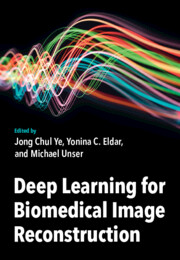Book contents
- Frontmatter
- Dedication
- Contents
- List of Contributors
- Preface
- Part I Theory of Deep Learning for Image Reconstruction
- Part II Deep-Learning Architecture for Various Imaging Architectures
- 5 Deep Learning for CT Image Reconstruction
- 6 Deep Learning in CT Reconstruction: Bringing the Measured Data to Tasks
- 7 Overview of the Deep-Learning Reconstruction of Accelerated MRI
- 8 Model-Based Deep-Learning Algorithms for Inverse Problems
- 9 k-Space Deep Learning for MR Reconstruction and Artifact Removal
- 10 Deep Learning for Ultrasound Beamforming
- 11 Ultrasound Image Artifact Removal using Deep Neural Networks
- Part III Generative Models for Biomedical Imaging
8 - Model-Based Deep-Learning Algorithms for Inverse Problems
from Part II - Deep-Learning Architecture for Various Imaging Architectures
Published online by Cambridge University Press: 15 September 2023
- Frontmatter
- Dedication
- Contents
- List of Contributors
- Preface
- Part I Theory of Deep Learning for Image Reconstruction
- Part II Deep-Learning Architecture for Various Imaging Architectures
- 5 Deep Learning for CT Image Reconstruction
- 6 Deep Learning in CT Reconstruction: Bringing the Measured Data to Tasks
- 7 Overview of the Deep-Learning Reconstruction of Accelerated MRI
- 8 Model-Based Deep-Learning Algorithms for Inverse Problems
- 9 k-Space Deep Learning for MR Reconstruction and Artifact Removal
- 10 Deep Learning for Ultrasound Beamforming
- 11 Ultrasound Image Artifact Removal using Deep Neural Networks
- Part III Generative Models for Biomedical Imaging
Summary
This chapter provides a summary of some popular model-based deep learning methods and their extensions. Section 8.1 briefly describes classical model-based methods and their benefit as well as limitations. Section 8.2 describes how deep learning can help in overcoming some limitations of classical model-based methods. Section 8.3 discusses how to incorporate a pre-trained deep network as a regularizer using the plug-and-play approach. Section 8.4 describes end-to-end training using a model-based deep learning framework. This section also discusses some benefits and limitations of end-to-end training. Section 8.5 and 8.6 describe unsupervised model-based deep learning approaches when a clean training dataset is not available. Section 8.6 considers model mismatch issues as well as the joint design of acquisition and reconstruction frameworks.
Information
- Type
- Chapter
- Information
- Deep Learning for Biomedical Image Reconstruction , pp. 177 - 199Publisher: Cambridge University PressPrint publication year: 2023
